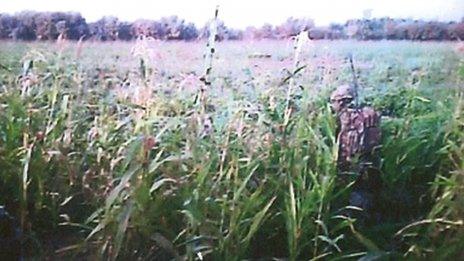Marine murder leniency call wrong, chief of the defence staff says
- Published
"Murder is murder, this is a heinous crime", Chief of Defence Staff Sir Nicholas Houghton told Andrew Marr
The murder of an Afghan insurgent by a Royal Marine was a "heinous" crime and the armed forces should not request leniency when he is sentenced, the chief of defence staff has said.
Gen Sir Nick Houghton said it would be "quite wrong" for the armed forces to expect special provision from the law.
The sergeant, identified only as Marine A, was convicted on Friday over the shooting of the unknown man in 2011.
A retired commander has said he should be shown leniency when he is sentenced.
Marine A, who was convicted after a court martial in Wiltshire, faces a mandatory life sentence, but a minimum term will be set at a sentencing hearing on 6 December.
On Saturday, Maj Gen Julian Thompson, who led 3 Commando Brigade during the Falklands War, said the shooting of the insurgent in Helmand Province, Afghanistan, was "totally wrong, totally unforgiveable" and it was "quite right" that Marine A would be sentenced.
But he said it was not known what pressure the sergeant might have been under in the past and some sort of clemency should be exercised.
'Immaculate standards'
A five-year or 10-year term would be more appropriate than life, he said.
But, speaking to the BBC's Andrew Marr programme on Sunday, Gen Houghton said there was a due process that would lead to sentencing, and that process was to determine whether or not clemency could be shown.

The Afghan insurgent was shot after being found in a field
"Those in authority over the armed forces should not request any form of leniency... that would be a dangerous thing to do," he said.
"Murder is murder - this is a heinous crime."
He said the armed forces expected "immaculate standards" from its servicemen and women and the Army had to be "immaculate" in upholding judicial process.
"If we try to put ourselves beyond the law or expect special provision from the law, then we start to erode the position where we have a moral ascendancy over those that are our enemies and that is the wrong thing to do," he said.
On a visit to Helmand, Defence Secretary Philip Hammond said he had not heard any calls for clemency from anyone deployed there.
He told the Sky News Murnaghan programme he believed the case of Marine A was an "isolated incident" and soldiers in Afghanistan understood that part of what makes them different from insurgents and terrorists was the Army "maintained a certain standard".
"These are standards that are core to our values as a society and core to the values of the British armed forces," he said.
"I have heard no suggestion since I have been here that there is any request for special treatment for anyone convicted of the crime of murder."
'Amounted to execution'
The trial at the Military Court Centre in Bulford was the first time a member of the British forces had faced a murder charge in relation to the conflict in Afghanistan, which began in 2001.
Two other marines were cleared. An anonymity order was granted last year to protect the three men from possible reprisals.
The murder took place after a patrol base in Helmand came under attack from small arms fire from two insurgents.
The Afghan insurgent had been seriously injured by gunfire from an Apache helicopter sent to provide air support, and the marines found him in a field.
One of the cleared marines - known as Marine B - inadvertently filmed the murder on his helmet-mounted camera and that footage, taken on 15 September 2011, was shown to the court during the two-week trial.
It showed Marine A shooting the Afghan prisoner with a 9mm pistol, and saying: "There, shuffle off this mortal coil... It's nothing you wouldn't do to us."
He adds: "Obviously this doesn't go anywhere fellas. I just broke the Geneva Convention," to which Marine B replies: "Yeah, roger mate."
During the court martial, prosecutor David Perry told the court the murder was "not a killing in the heat and exercise of any armed conflict. It amounted to an execution".
Marine A told the court martial he had fired because of "poor judgement and lack of self-control", but said he had thought the insurgent was already dead.
- Published9 November 2013
- Published8 November 2013
- Published8 November 2013
- Published8 November 2013
- Published8 November 2013
- Published7 November 2013